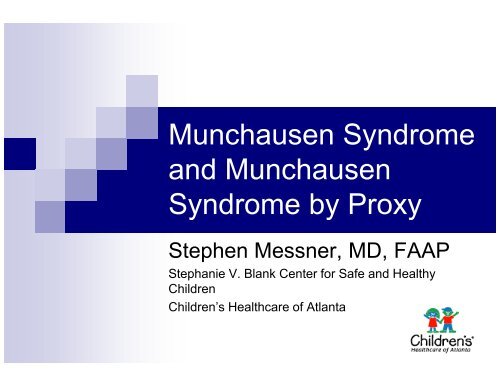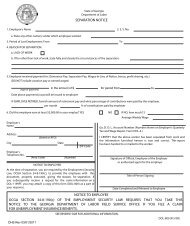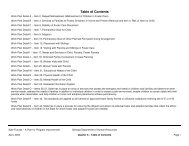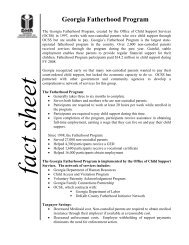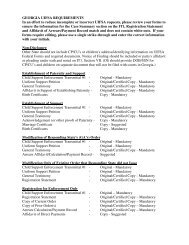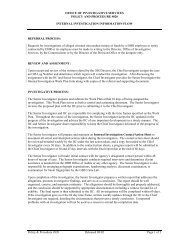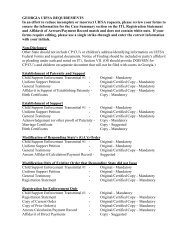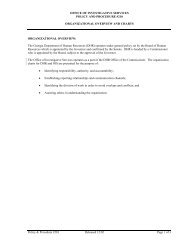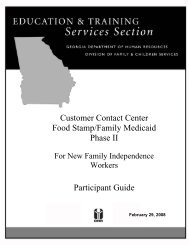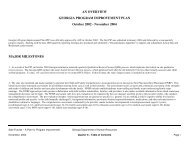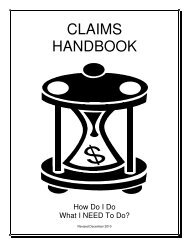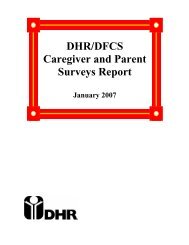Munchausen Syndrome and Munchausen Syndrome by Proxy
Munchausen Syndrome and Munchausen Syndrome by Proxy
Munchausen Syndrome and Munchausen Syndrome by Proxy
You also want an ePaper? Increase the reach of your titles
YUMPU automatically turns print PDFs into web optimized ePapers that Google loves.
<strong>Munchausen</strong> <strong>Syndrome</strong><br />
<strong>and</strong> <strong>Munchausen</strong><br />
<strong>Syndrome</strong> <strong>by</strong> <strong>Proxy</strong><br />
Stephen Messner, MD, FAAP<br />
Stephanie V. Blank Center for Safe <strong>and</strong> Healthy<br />
Children<br />
Children’s Healthcare of Atlanta
Child Abuse<br />
Many forms<br />
Sexual abuse<br />
Physical abuse<br />
Medical neglect
Fatal child abuse<br />
Typically from Physical abuse<br />
Medical neglect<br />
Neglect<br />
Rate increasing over past years from 1.96 to<br />
2.03 / 100K<br />
May represent increased reporting
Munch…what?<br />
<strong>Munchausen</strong> syndrome is psychiatric<br />
diagnosis<br />
Fake illnesses, diseases in order to draw<br />
attention to themselves<br />
AKA self-inflicted factitious disorder
Malingering vs. Muchausen<br />
Malingering<br />
Fabricated physical or psych disorder<br />
Secondary gain<br />
<strong>Munchausen</strong><br />
Fabricated physical or psych disorder<br />
No secondary gain
Origins<br />
Named for Baron von Münchhausen<br />
Told tall tales after returning from war<br />
of going to the moon, etc.<br />
1720-1797<br />
In 1950, Sir Richard Asher was first to<br />
describe condition of self-harm
<strong>Munchausen</strong> <strong>Syndrome</strong><br />
Need to assume role of patient<br />
Welcome invasive testing<br />
Welcome surgical interventions
<strong>Munchausen</strong> <strong>Syndrome</strong> <strong>by</strong> <strong>Proxy</strong><br />
(MSBP)<br />
Pediatric falsification syndrome<br />
Fabricated or induced illness<br />
Polle’s syndrome<br />
Meadow’s syndrome
Recent changes to nomenclature<br />
APSAC recommends use of terms:<br />
Pediatric condition falsification – describe the<br />
abuse itself<br />
Factitious disorder <strong>by</strong> proxy – describe the motive<br />
behind the abuse<br />
<strong>Munchausen</strong> <strong>Syndrome</strong> <strong>by</strong> <strong>Proxy</strong> when both are<br />
present
MSBP<br />
First described in 1977 <strong>by</strong> British pediatrician<br />
Sir Roy Meadow<br />
2 mothers<br />
One fed child excessive amounts of salt<br />
One put her own blood in child’s urine specimens<br />
Intentionally producing physical <strong>and</strong>/or<br />
psychological signs or symptoms in another<br />
person
MSBP<br />
Typically seen in children<br />
Form of physical, sexual abuse <strong>and</strong>/or neglect<br />
Falls under child abuse laws in terms of reporting<br />
Cases documented in adults
MSBP<br />
Different from somatoform disorder<br />
Signs/symptoms real to person<br />
Not voluntary, not simulated<br />
Different from malingering <strong>by</strong> proxy<br />
Children coached to fake disabilities<br />
Secondary gain
Epidemiology<br />
True numbers unknown<br />
Diagnostic criteria vary<br />
Children < 1 year<br />
2 cases/ 100K<br />
Children < 16 years<br />
0.5 cases/ 100K
MSBP families<br />
Siblings often victims<br />
Study <strong>by</strong> Bools 1992<br />
30% siblings poisoned or abused<br />
Numerous sibling deaths<br />
Sibling deaths from SIDS<br />
Sequential MSBP reported 1998 <strong>by</strong> Arnold<br />
Benadryl poisoning<br />
2 siblings
Simulating illness<br />
State false history<br />
Seizure<br />
Fever<br />
Illness without physical signs
Producing illness<br />
Caregiver causes a condition in the child<br />
Poisoning child<br />
Asphyxiating child<br />
Much more common than simulating illness<br />
Rosenberg study showed 70% producing<br />
illness
Victims<br />
Usually less than 5 years old<br />
Mean age 20 months<br />
No gender predominance<br />
Signs/symptoms disappear when removed<br />
from offender
Offender<br />
Typically white, middle to upper class,<br />
educated<br />
No socioeconomic group immune<br />
Usually mother/female caregiver<br />
Contrast to MS – offender is typically male<br />
Usually have healthcare training
Common Characteristics<br />
MSBP Offender<br />
<br />
<br />
<br />
<br />
<br />
<br />
<br />
<br />
<br />
Bio mother<br />
Extensive praise to medical staff<br />
High degree of attentiveness<br />
Calm despite severity of child’s illness<br />
Shelters the victim<br />
Knowledgeable about victim’s illness<br />
Some degree of medical education<br />
History of similar illness as the child<br />
Welcomes painful medical tests <strong>and</strong> procedures without question<br />
From: Holstege <strong>and</strong> Dobmeier. “Criminal Poisoning: <strong>Munchausen</strong> <strong>by</strong> <strong>Proxy</strong>”. Clin Lab Med 26 (2006) 246
Common Characteristics<br />
MSBP Victims<br />
<br />
<br />
<br />
<br />
<br />
<br />
<br />
<br />
<br />
<br />
<br />
Dependent<br />
Display separation anxiety<br />
Immature<br />
Symbiotic relationship with caregiver<br />
Views offender as ideal parent<br />
Passively tolerates medical procedures<br />
Excessive school absence<br />
Not involved in normal social activities<br />
Failure to thrive<br />
Illness corresponds with presence of caregiver<br />
Illness resolves with close surveillance<br />
From: Holstege <strong>and</strong> Dobmeier. “Criminal Poisoning: <strong>Munchausen</strong> <strong>by</strong> <strong>Proxy</strong>”. Clin Lab Med 26 (2006) 24
Suspicions for MSBP<br />
Child with multiple hospitalizations/medical visits<br />
Medical problems unresponsive to treatment, follow<br />
unusual course<br />
PE/lab findings that are highly unusual, don’t fit with<br />
history, or are impossible<br />
Caregiver is medically knowledgeable or is<br />
interested in medical details<br />
Caregiver enjoys being in hospital environment
Suspicions for MSBP<br />
Caregiver expresses interest in other patients’<br />
illnesses<br />
Typically reluctant to leave child’s side<br />
May be unusually calm in face of child’s illness <strong>and</strong><br />
is supportive/encouraging of the physician<br />
May be angry, dem<strong>and</strong>ing more procedures/transfer<br />
to “better” hospital
Suspicions for MSBP<br />
Symptoms not present when away from<br />
caregiver<br />
May be family history of sibling with<br />
unexplained illness or death<br />
Emotionally distant relationship between the<br />
parents
Intentional poisonings<br />
McClure article 1996 case series 128 children<br />
MSBP<br />
40 children poisoned<br />
38 different toxins<br />
71% were prescription drugs<br />
Most common drugs were anticonvulsants <strong>and</strong><br />
opiates
Poisonings<br />
Very difficult to differentiate from true illness<br />
Window for toxicology usually closed once<br />
realization of possible poisoning
Cases of hypoglycemia<br />
Low blood glucose<br />
Seen in patients with insulinoma<br />
Also seen in patients taking insulin or oral<br />
hypoglycemic meds<br />
Case report in Pediatrics 2005 of patient<br />
undergoing pancreatectomy
Vomiting <strong>and</strong> ipecac<br />
Most common reported toxin in MSBP<br />
cases<br />
Available on Amazon.com for $2.79<br />
Can detect emetine <strong>and</strong> cephaeline in<br />
the urine for several weeks<br />
If given chronically, can cause GI<br />
bleed, electrolyte abnormalities,<br />
skeletal <strong>and</strong> cardiac myopathy<br />
Cardiomyopathy deaths reported
Initial Clues<br />
Medical providers<br />
Nurses<br />
Social workers
Difficulties in recognition<br />
Majority of parents have legitimate concerns<br />
There are medical conditions with these signs<br />
<strong>and</strong> symptoms<br />
Involvement of numerous<br />
doctors/subspecialties
Making the diagnosis<br />
Need to suspect MSBP<br />
Detailed, specific testing of blood, urine for<br />
toxins<br />
Resolution of symptoms when separated from<br />
caregiver<br />
Covert video surveillance (CVS)
Covert Video Surveillance<br />
Allows for 24/7 access to child’s environment<br />
without caregiver knowledge<br />
Not available in all hospital settings<br />
Is available at Children’s Healthcare of Atlanta
Making the call for CVS<br />
Multidisciplinary team<br />
Doctors<br />
Nurses<br />
Risk Management<br />
Social Work<br />
Legal<br />
Security
Role of Physician<br />
Usually the first person to raise concerns<br />
about MSBP<br />
Reviews medical records to look for patterns,<br />
unexplained illnesses in past<br />
Relay to team information about work-up <strong>and</strong><br />
results to date
Role of Nursing<br />
Have more direct interaction with patient <strong>and</strong><br />
family<br />
Can fill the team in on details of hospital<br />
behaviors<br />
Give insight about mom’s interaction with<br />
hospital staff <strong>and</strong> other parents
Role of Risk Management<br />
Evaluate the need for invasion of privacy<br />
Evaluate risk of harm to child<br />
Make recommendations to team about<br />
Make recommendations to team about<br />
necessity of CVS
Role of Social Work<br />
Explore social aspects of parent<br />
Serve as resource for parent<br />
Report to team any information gleaned from<br />
Report to team any information gleaned from<br />
parent about life outside of hospital
Role of Attorney<br />
Work with risk management to determine<br />
when invasion of privacy outweighs risk of<br />
possible harm to child<br />
Create documents allowing for CVS
Role of Security<br />
Monitor the CVS 24/7<br />
Report any suspicious activity to nursing staff<br />
Maintain accurate documentation
Team approach<br />
“The complexities involved in MSBP case<br />
compilation necessitates a union of forces<br />
within the legal, medical, social/protective<br />
service, <strong>and</strong> law enforcement professions.<br />
There is no other type of investigation that<br />
requires an underst<strong>and</strong>ing <strong>and</strong> protocol<br />
between agencies to the degree required in<br />
MSBP investigations”<br />
Kathryn Artingstall in “Practical aspects of muchausen <strong>by</strong> proxy <strong>and</strong> munchausen syndrome investigation”
Use of CVS at CHOA<br />
Started in 1993<br />
41 patients monitored 1993-1997<br />
Dr Hall published results in Pediatrics in 2000
CHOA cases<br />
23 of the 41 cases were determined to be<br />
MSBP<br />
13 required CVS in making the diagnosis <strong>and</strong><br />
supportive of the diagnosis in 5<br />
5 confirmed case without requiring CVS<br />
2 confirmed <strong>by</strong> labs<br />
2 confirmed <strong>by</strong> direct observation<br />
1 confession
CHOA cases<br />
Recurrent sepsis<br />
Mom found to be injecting urine into IV<br />
Unexplained lethargy<br />
Mom putting chloral hydrate in GTube
Mothers’ behaviors<br />
Remarkable for the fabrication group<br />
Heard on phone telling lies to family members <strong>and</strong><br />
friends<br />
Mom told of need for operation <strong>and</strong> her unwillingness<br />
Mom described constant seizures when there were<br />
none<br />
Moms attentive to child when medical staff present<br />
<strong>and</strong> ignore child later
Atlanta profiles<br />
All perpetrators in study were the mothers<br />
Subsequently, there has been at least 1 father<br />
seen on CVS harming child<br />
Majority of moms (55%) worked in healthcare<br />
setting<br />
25% worked in daycare<br />
85% either mom or dad worked in healthcare or<br />
daycare fields
Atlanta presenting signs/symptoms<br />
Apnea<br />
Persistent undiagnosed symptoms<br />
Vomiting
Atlanta methods of injury<br />
Suffocation<br />
Injection of body fluid<br />
Giving oral medication<br />
Fabrication
MSBP ruled out <strong>by</strong> CVS<br />
4 cases with CVS for suspicion of MSBP<br />
8 month old with central sleep apnea<br />
7 year old with multiple diagnoses<br />
1 year old with apneic episodes observed to have<br />
anxious <strong>and</strong> frightened mom with false alarms<br />
3 year old with apnea diagnosed with seizures
CVS in UK<br />
2 hospitals in UK<br />
Children admitted with ALTEs<br />
39 children<br />
33 of 39 shown to be abused using CVS<br />
Suffocation shown in 30 cases<br />
Poisoning <strong>and</strong> intentional fracture observed
As in the AJC 3/12/07<br />
Father caught trying to suffocate son<br />
A father was arrested Sunday at a children's hospital, charged with trying to kill his ba<strong>by</strong>.<br />
Concerned because the 3-month-old boy was having recurring breathing problems that a battery of tests failed to diagnose,<br />
hospital officials placed a camera in the ba<strong>by</strong>'s room <strong>and</strong> were shocked <strong>by</strong> what they saw: The boy's father, police said, had<br />
his h<strong>and</strong>s over the infant's mouth <strong>and</strong> nose, suffocating him.<br />
Staffers stopped the father <strong>and</strong> called police. The father, Michael Charles Callaway, is now in the Fulton County Jail,<br />
charged with aggravated assault <strong>and</strong> cruelty to children.<br />
Callaway's son had been at the Children's Healthcare of Atlanta at Scottish Rite since late February.<br />
S<strong>and</strong>y Springs police said the child was placed in a room with a hidden video camera, which caught Callaway, 28, of<br />
Blairsville, covering his child's nose <strong>and</strong> mouth deliberately, said Lt. Steve rose.<br />
Kevin McClell<strong>and</strong>, a hospital spokesman, said hospital officials are working with authorities but would not release any details<br />
about the case, citing patient confidentiality <strong>and</strong> the ongoing criminal investigation.<br />
Rose said police are trying to see whether it is a case of <strong>Munchausen</strong> <strong>Syndrome</strong> <strong>by</strong> <strong>Proxy</strong>, a mental condition where a<br />
caregiver induces an illness in a person under their care in order to attract attention to themselves.<br />
The boy was released from the hospital Monday because doctors found nothing wrong with him.
Despite proven MSBP, there’s<br />
the discredited theory of Mothers Against<br />
<strong>Munchausen</strong> <strong>Syndrome</strong> <strong>by</strong> <strong>Proxy</strong> Allegations
Per the website www.msbp.com<br />
“The madness continues as the "experts" debate over this controversial diagnosis. Some say it is rare,<br />
while others claim it is common. The evolution of this diagnosis continues as even the name is<br />
debated...Factitious Disorder <strong>by</strong> <strong>Proxy</strong>, Meadow's <strong>Syndrome</strong>, Pediatric Falsification, etc. All while vying to<br />
be the top expert in this field, some claim it is a psychiatric condition, while others state it is a medical<br />
diagnosis, or a pattern of behavior. Yet they all involve identifying the psychological motivation of the<br />
parent. <strong>Munchausen</strong> <strong>by</strong> <strong>Proxy</strong> is not recognized <strong>by</strong> the American Medical Association or the American<br />
Psychiatric Association. Any physician who diagnoses this 'disorder' rather than identifying actual abuse <strong>by</strong><br />
medical evidence, should be reported to the Ethics board.<br />
Innocent Mothers Are Profiled <strong>and</strong> removed from their medically fragile child without any evidence that<br />
a crime has even occurred. Often, on the basis of a single phone call from a doctor, CPS will rush in <strong>and</strong><br />
confiscate a child without even interviewing the parents, leaving the "investigation" to the accusing<br />
physician! Mom <strong>and</strong> dad will be instantly treated as criminals, guilty until proven innocent, <strong>and</strong> may lose<br />
the rest of their children as well. In reality, the accusers, medical caregivers <strong>and</strong> Child Protective Service<br />
(CPS) workers often perpetrate the real abuse.”
Stems from a case at V<strong>and</strong>erbilt<br />
Philip Patrick<br />
Died at 11 months of age<br />
Mother, Julie, started the webpage<br />
She was exonerated after review of autopsy<br />
showed he died of peritonitis<br />
MSBP was given as initial cause of death <strong>and</strong><br />
parents were only allowed limited visitations
AAP<br />
Recognize MSBP<br />
States that CVS is not the gold st<strong>and</strong>ard for<br />
diagnosis of MSBP<br />
Advises use of multidisciplinary team<br />
approach to cases of suspected MSBP
Dr Meadows<br />
First to describe MSBP in UK (1977)<br />
<br />
<br />
<br />
<br />
<br />
<br />
“one sudden infant death is a tragedy, two is suspicious <strong>and</strong><br />
three is murder, until proved otherwise“ – Meadow’s Law<br />
Expert testimony about cot death <strong>and</strong> MSBP<br />
Sally Clark found guilty of death of her 2 sons mainly due to<br />
Meadows’ testimony<br />
Court overturned some convictions in past<br />
Does NOT discount diagnosis of MSBP<br />
Often cited <strong>by</strong> defense to counter MSBP diagnosis
A diagnosis is made, now what?<br />
First <strong>and</strong> foremost, protect the child<br />
At CHOA, nurse alerted <strong>and</strong> removes child<br />
from caregiver<br />
CVS reviewed <strong>and</strong> if felt to show intentional<br />
harm, law enforcement notified
Psychiatric treatment<br />
Needed for caregivers<br />
Often needed for victims<br />
Reports of having significant psychological<br />
difficulties later in life<br />
Conversion symptoms<br />
Fabrications<br />
Poor school attendance<br />
Poor concentration
Survivors of MSBP<br />
Many suffer from PTSD<br />
Difficulty maintaining relationships<br />
Insecurity<br />
Often play victim role<br />
Difficulty separating fantasy from reality
Role of the internet<br />
Increasing availability of medical diagnoses to<br />
lay persons<br />
Potentially enabling offenders<br />
Allows for sympathizers as well
Confusion <strong>and</strong> misdiagnosis<br />
Patients with unexplained medical findings<br />
may have real disease<br />
Numerous tests often necessary to rule in or<br />
rule out various diagnoses<br />
Don’t want to “jump” to diagnosis of MSBP
Doctor shoppers<br />
Parents often take their children to numerous<br />
doctors for “second opinions”<br />
Seen in both MSBP <strong>and</strong> non-MSBP cases<br />
Isn’t indicative of harm, <strong>and</strong> in most cases,<br />
shows true concern
Role of community<br />
Recognize that MSBP does occur<br />
Awareness of child abuse in general<br />
Collaboration of various agencies on these<br />
difficult cases<br />
Maintain balance of privacy <strong>and</strong> protecting<br />
children from harm
Refining the process<br />
Analyze each case to make improvements<br />
Exp<strong>and</strong> surveillance of the rooms<br />
Put plans in place for unique situations – such<br />
as non-English speaking parents<br />
Protocol
Case of MSBP in PICU<br />
Not previously described<br />
Often felt that MSBP couldn’t occur in closely-<br />
monitored environment such as the ICU<br />
3 year old seen being extubated <strong>by</strong> mother on<br />
CVS
Increasing awareness<br />
Needed <strong>by</strong> all medical providers in order to<br />
diagnose MSBP early<br />
Will save lives, invasive procedures<br />
Not limited to medical personnel
Summary of MSBP<br />
Caregiver, typically mother, either inducing or<br />
simulating illness in child<br />
Perps seem to “enjoy” the medical<br />
environment<br />
Diagnosis often not in differential<br />
Requires multidisciplinary team approach<br />
There is a role for CVS
Videos<br />
http://www.youtube.com/watch?v=UVLqADEdr<br />
ig&feature=related
Questions


